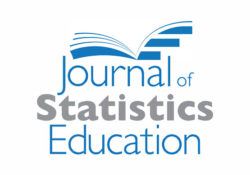tandfonline.com har udgivet en rapport under søgningen “Teacher Education Mathematics”: Evaluating Causal Dominance of CTmeta-Analyzed Lagged Regression Estimates Link til kilde
Like this:
Like Loading...
eric.ed.gov har udgivet: Karabatsos and Walker (2011) introduced a new Bayesian nonparametric (BNP) regression model. Through analyses of real and simulated data, they showed that the BNP regression model outperforms other parametric and nonparametric regression models of common use, in terms of predictive accuracy of the outcome (dependent) variable. The other, outperformed, regression models include random-effects/hierarchical linear and generalized linear models, when the random effects were assumed to be normally-distributed (Laird & Ware, 1982; Breslow & Clayton 1993), and when the random effects were more generally modeled by a nonparametric, Dirichlet process (DP) mixture prior (Kleinman & Ibrahim, 1998a,1998b). The authors argue that the new Bayesian nonparametric (BNP) regression model provides a novel, richer, and more valid approach to causal inference, which allows the researcher to investigate how treatments causally… Continue Reading →
Like this:
Like Loading...
eric.ed.gov har udgivet: American students are failing to demonstrate expected competency on basic skills taught in schools. The educational system needs a major overhaul to address declines in scholarly engagement. The State Board of Education (SBE) designed the California High School Exit Exam (CAHSEE) to give some merit to the high school diploma. Minorities and economically disadvantaged students fail to attain minimal proficiency levels on standardized tests and to achieve gains comparable to those attained by students from affluent school districts, even when the most rudimentary skills are being tested. The purpose of this study is to compare existing differences in student achievement by viewing existing data and to gauge faculty perspectives on why some students fare better than others on the CAHSEE. Appended are: (1) Letter of Informed Consent;… Continue Reading →
Like this:
Like Loading...
tandfonline.com har udgivet en rapport under søgningen “Teacher Education Mathematics”: ABSTRACT ABSTRACT This study investigates how different visual representations of price facilitate learning in upper secondary social science education. Three lessons on pricing were given to four classes (n = 94 students). Two classes had lessons based on graphs and two on a causal loop diagram. Written pre- and post-test answers were analysed phenomenographically and results arising from the two visual representations were compared. Results suggested that a causal loop diagram facilitated a more complex way of understanding the causal relationships in pricing than the graph. The traditional way of introducing price, through the use of supply/demand graphs, is thereby problematised. The study extends knowledge by identifying a synergy between phenomenography and research on visual representations and has specific implications for teaching… Continue Reading →
Like this:
Like Loading...
tandfonline.com har udgivet en rapport under søgningen “Teacher Education Mathematics”: Link til kilde
Like this:
Like Loading...
eric.ed.gov har udgivet: Attribution theory deals with the question of how individuals make judgments and seek to explain how they consider the causes of their behaviours and those of others. Attributions have the potential to affect beliefs, emotions and behaviour. Therefore, attribution theory has significantly contributed to the studies on motivation. This study examined student teachers’ causal attributions for success and failure in mathematics. The participants in this study were 28 student teachers in the department of secondary school mathematics education at a public university in the north of Turkey. To collect data, a questionnaire composed of one open-ended question was administered to the student teachers and they were asked to write their opinion about the causes of a student’s failure and success in mathematics. Student teachers wrote and submitted… Continue Reading →
Like this:
Like Loading...
eric.ed.gov har udgivet: The authors’ goal was to evaluate the potential of Math Recovery (MR), a pullout, one-to-one tutoring program that has been designed to increase mathematics achievement among low-performing first graders, thereby closing the school-entry achievement gap and enabling participants to achieve at the level of their higher-performing peers in the regular mathematics classroom. Specifically, the research questions were as follows: (1) Does participation in MR raise the mathematics achievement of low performing first-grade students?; (2) If so, do participating students maintain the gains made in first grade through the end of second grade? The two-year evaluation of Math Recovery was conducted in 20 elementary schools (five urban, ten suburban and five rural), representing five districts in two states. Students were selected for participation at the start of first… Continue Reading →
Like this:
Like Loading...

tandfonline.com har udgivet en rapport under søgningen “Teacher Education Mathematics”: Abstract Abstract Over the last two decades, statistics educators have made important changes to introductory courses. Current guidelines emphasize developing statistical thinking in students and exposing them to the entire investigative process in the context of interesting research questions and real data. As a result, many concepts (confounding, multivariable models, study design, etc.) previously reserved only for higher-level courses now appear in introductory courses. Despite these changes, causality is rarely discussed in introductory courses, except for warning students “correlation does not imply causation” or covering the special case of randomized controlled experiments. In this article, we argue causal inference concepts align well with statistics education guidelines for introductory courses by developing statistical and multivariable thinking, exposing students to many aspects… Continue Reading →
Like this:
Like Loading...
tandfonline.com har udgivet en rapport under søgningen “Teacher Education Mathematics”: Abstract Formulae display:?Mathematical formulae have been encoded as MathML and are displayed in this HTML version using MathJax in order to improve their display. Uncheck the box to turn MathJax off. This feature requires Javascript. Click on a formula to zoom. Abstract Basic knowledge of ideas of causal inference can help students to think beyond data, that is, to think more clearly about the data generating process. Especially for (maybe big) observational data, qualitative assumptions are important for the conclusions drawn and interpretation of the quantitative results. Concepts of causal inference can also help to overcome the mantra “Correlation does not imply Causation.” To motivate and introduce causal inference in introductory statistics or data science courses, we use simulated data… Continue Reading →
Like this:
Like Loading...
tandfonline.com har udgivet en rapport under søgningen “Teacher Education Mathematics”: Abstract Formulae display:?Mathematical formulae have been encoded as MathML and are displayed in this HTML version using MathJax in order to improve their display. Uncheck the box to turn MathJax off. This feature requires Javascript. Click on a formula to zoom. Theories of self-efficacy and approaches to learning are well-established in the psychology of learning. However, studies on relationships between the primary constructs on which these theories are developed are rarely reported in mathematics education research. Thus, the purpose of the current study is to provide empirical evidence for a potential causal relationship between perceived self-efficacy and approaches to learning. The present study adopts a cross-sectional survey research design that includes 195 engineering students enrolled on a first-year introductory calculus… Continue Reading →
Like this:
Like Loading...





